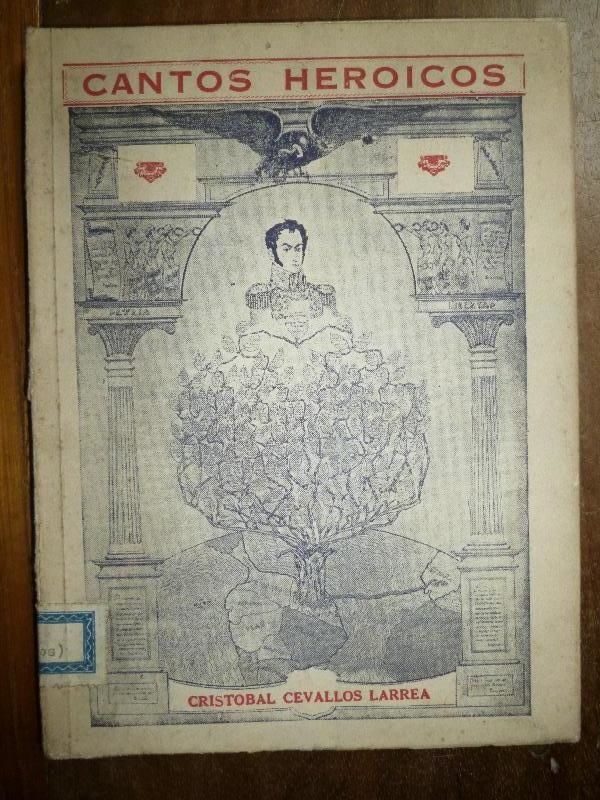Cristóbal Cevallos Larrea (1902-1978), holding a Doctorate in Law, was a multifaceted Ecuadorian intellectual, poet, writer, journalist, teacher, and jurist who had a significant influence on Ecuador’s cultural landscape. Cristóbal Cevallos Larrea demonstrated his dedication to cultural enrichment by leading the Chimborazo branch of the Casa de la Cultura in Riobamba, serving as a founding member in 1953 and later as its president in 1964, as well as heading the Ateneo del Chimborazo. In legal and educational spheres, Larrea held the positions of Minister and President of the National Court of Justice and taught Constitutional and Political Law and Civic Studies at the Colegio Nacional Maldonado in Riobamba for many years. Among his literary works, “La Gesta Amazónica” is renowned as an epic poem dedicated to the Amazon.
Career and Interests
In his career, Cristóbal Cevallos Larrea demonstrated a profound commitment to public service, education, and cultural enrichment. As a journalist, he led two important publications, the magazine of the Colegio Nacional Maldonado and the magazine of the Chimborazo branch of the House of Ecuadorian Culture. His dedication to education was further evident in his long-standing role as a professor at the Colegio Nacional Maldonado, where he taught Constitutional Law and Civic Studies. Moreover, Larrea’s legal career was distinguished by significant positions, including serving as Minister and President of the Superior Court of Justice. Larrea’s contribution to the House of Ecuadorian Culture, especially his co-founding of its Chimborazo branch in 1953, and serving as its president in 1964, underscored his commitment to the promotion and preservation of Ecuador’s cultural heritage.
Literary Contributions
Cristóbal Cevallos Larrea’s literary contributions have left an indelible impact on the world of literature through his varied and rich body of work. His oeuvre, encompassing significant works like “La Gesta Amazónica” (1945), “Cantos Heróicos y otros poemas” (1948), “El ruego” (1950), “Voces líricas” (1958), “Bronces” (1965), and the second edition of “Reverberaciones” (1947), showcases his mastery across a spectrum of themes and forms.
Legacy
Cristóbal Cevallos Larrea’s legacy is etched deeply into the cultural and intellectual fabric of Ecuador. Through his varied roles as a poet, jurist, educator, and cultural leader, Larrea left an indelible mark on the promotion and preservation of Ecuadorian arts, culture, and legal scholarship. His leadership in foundational cultural institutions like the Casa de la Cultura in Riobamba and the pivotal Chimborazo branch, along with his literary contributions, particularly “La Gesta Amazónica,” underscore his commitment to Ecuador’s cultural heritage. His works not only celebrate the nation’s rich landscapes and histories but also contribute to a deeper understanding and appreciation of its diverse identity. Larrea’s influence extends beyond his literary achievements to his significant roles in the judicial and educational systems, where he shaped future generations through his teachings in law and civic studies. His enduring legacy is a testament to a life dedicated to enhancing Ecuador’s cultural and intellectual realms, leaving a legacy that continues to inspire and influence.
Timeline
- 1902 – Birth of Cristóbal Cevallos Larrea.
- 1945 – Publication of “La Gesta Amazónica,” achieving international recognition.
- 1948 – Publication of “Cantos Heróicos y otros poemas.”
- 1950 – Publication of “El ruego.”
- 1953 – Founding member of the Casa de la Cultura Núcleo del Chimborazo.
- 1958 – Publication of “Voces líricas.”
- 1964 – Serves as President of the Casa de la Cultura Núcleo del Chimborazo.
- 1965 – Publication of “Bronces.”
- Throughout his career, served as a professor at the Colegio Nacional Maldonado, teaching Constitutional Law and Civic Studies.
- Held significant roles in the judiciary, including Minister and President of the Superior Court of Justice.
- 1978 – Passing of Cristóbal Cevallos Larrea.
Poem
The following poem is a heartfelt ode to the Virgin Mary, drawing parallels between Her divine sorrows and the tender, compassionate love he feels for his own mother, evoking a deep sense of devotion and filial affection.
| IMAGEN ADORABLE DE MI MADRE Cristóbal Cevallos Larrea Original Spanish ¡Oh, Madre Dolorosa! Yo te amo en mis horas de niebla y desventuras. Con inquietud de niño te reclamo cautivado en la red de tu ternura. Al mirar la tristeza de tus ojos, tus pupilas que naufragan en el llanto, con unción arrodíllase de hinojos toda mi alma, rendida de quebranto. Y mientras el dolor con saña impía, con sus agudos clavos de tortura tu pecho de bondad así taladre te seguiré adorando, Madre mía, porque veo en tu rostro de dulzura la imagen adorable de mi madre… | ADORABLE IMAGE OF MY MOTHER Cristóbal Cevallos Larrea English translation by Richard Gabela Oh, Sorrowful Mother! I love thee in my hours of fog and misfortune. With a child’s unease, I call out to thee ensnared in the net of thy tenderness. Upon seeing the sadness in thine eyes, thine pupils drowning in tears, with devotion, kneeling devoutly, my entire soul, overwhelmed by distress, bows. And while pain with cruel spite, with its sharp nails of torment, thus pierces thy chest of kindness, I shall continue to adore thee, My Mother, for I see in thy face of sweetness the adorable image of my mother… |
Selected Works

- La Gesta Amazónica (1945)
- Reverberaciones (Second edition 1947)
- Cantos Heróicos y otros poemas (1948)
- El ruego (1950)
- Voces líricas (1958)
- Bronces (1965)
